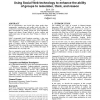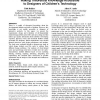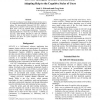521 search results - page 6 / 105 » Designing technology to aid cognition |
W4A
2010
ACM
13 years 7 months ago
2010
ACM
Supporting effective and enjoyable Web usage by people with sensory, motor and cognitive impairments requires more than just accessible Web content. There is an additional task of...
CHI
2009
ACM
14 years 10 months ago
2009
ACM
Senior citizens often find it difficult to remember names. This paper describes a novel cell phone application that uses information about one's social network and the places...
SIGMOD
2009
ACM
14 years 10 months ago
2009
ACM
We are experiencing a new Social Web, where people share, communicate, commiserate, and conflict with each other. As evidenced by systems like Wikipedia, twitter, and delicious.co...
CHI
2011
ACM
13 years 1 months ago
2011
ACM
There is a wealth of theoretical knowledge about the developmental abilities and skills of children. However, this knowledge is not readily accessible to designers of interactive ...
AAAI
2006
13 years 11 months ago
2006
LOCATE is workspace layout design software that also serves as a testbed for developing and refining principles of adaptive aiding. This demonstration illustrates LOCATE's ab...




